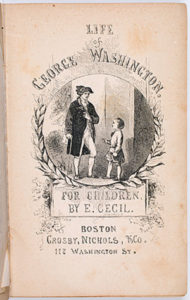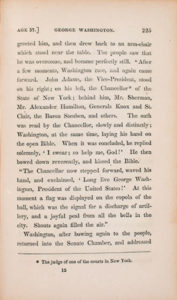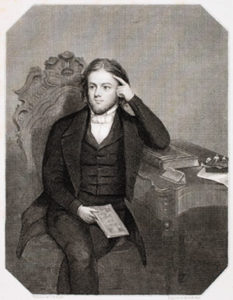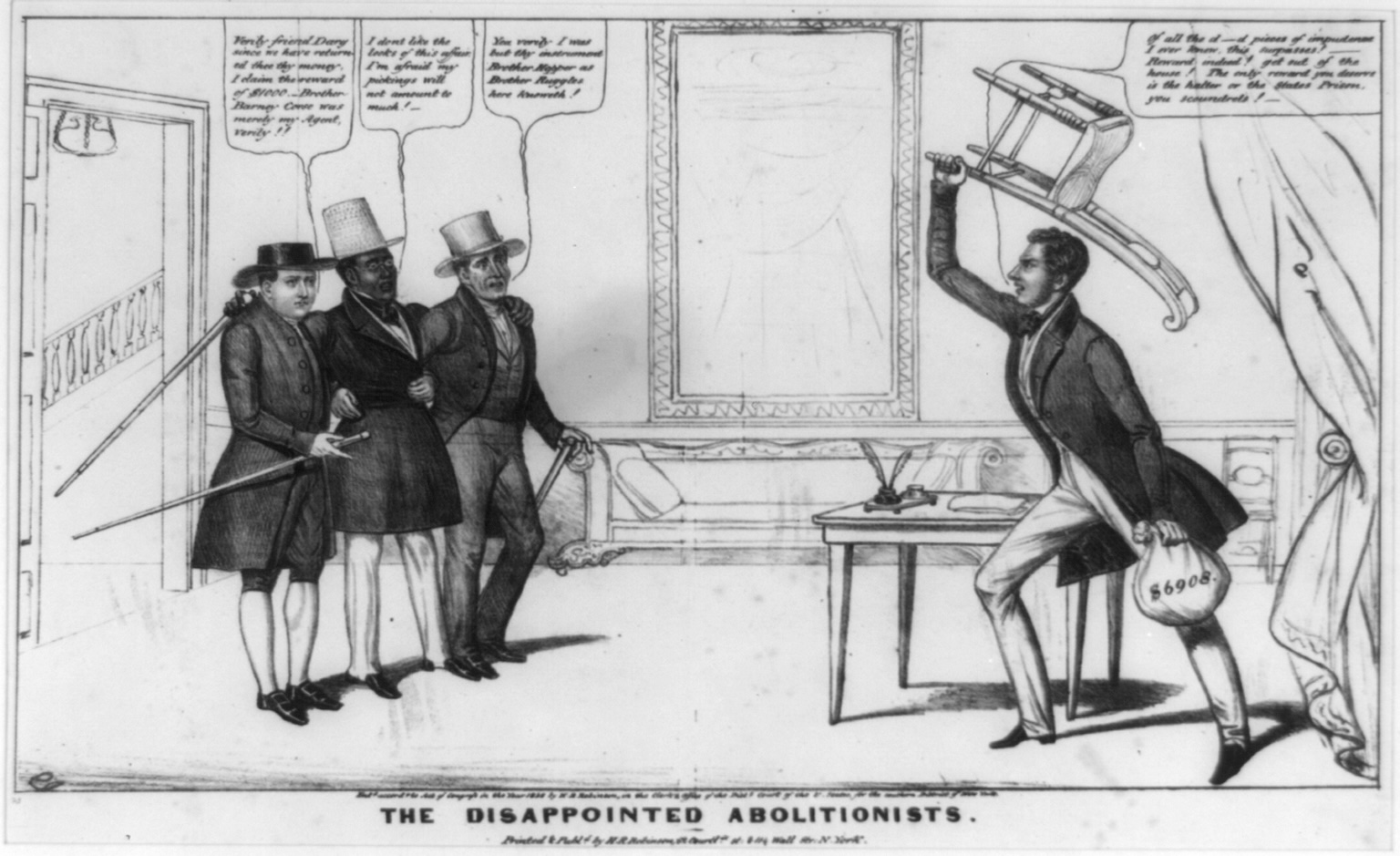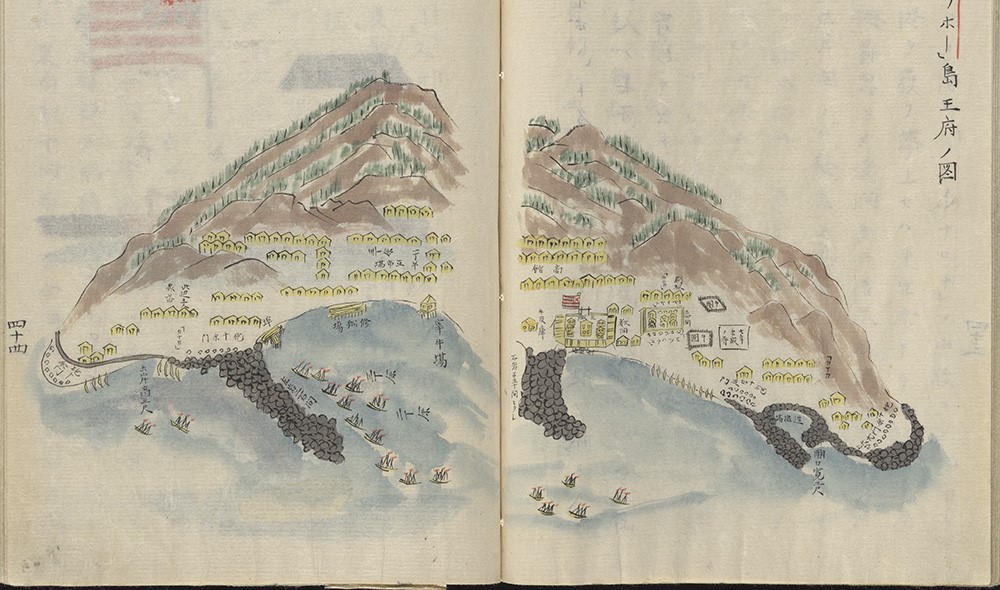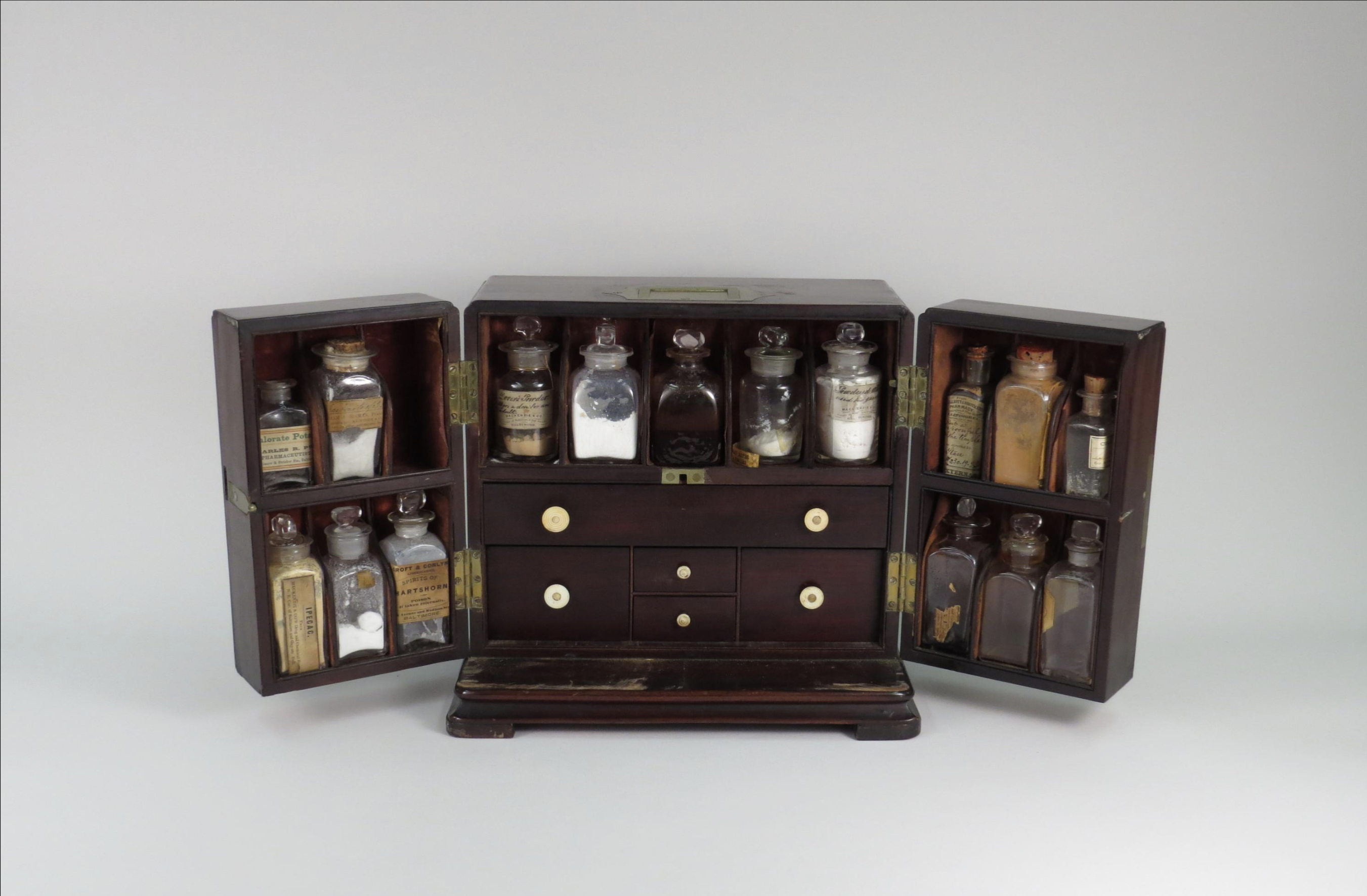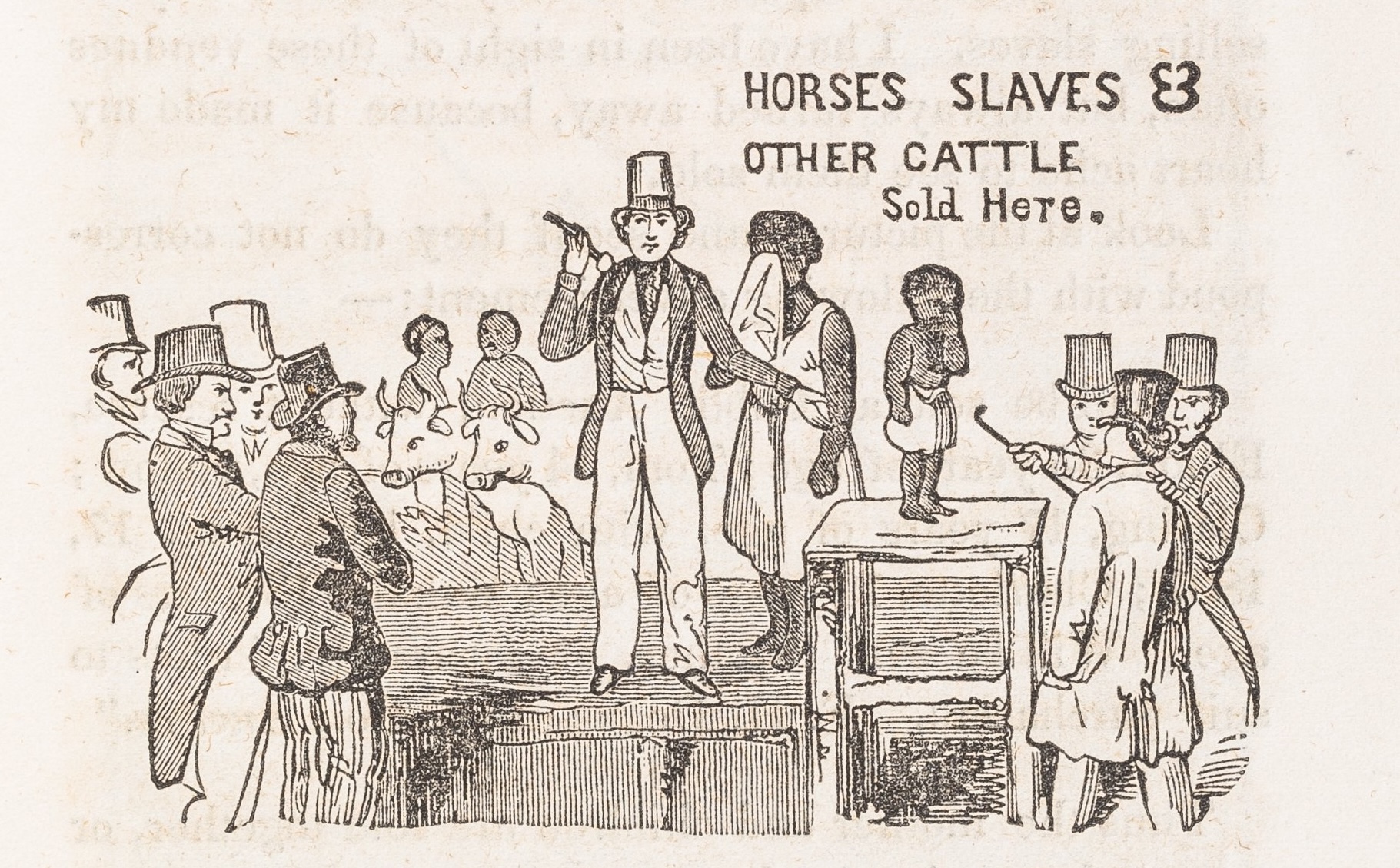On April 30, 1789, George Washington was inaugurated as the nation’s first president. According to the traditional story, he added “so help me God” to the words of the oath prescribed by the Constitution. However, that “traditional story” goes back only to 1854, when Rufus Griswold included it in a book titled The Republican Court. Griswold’s story caught on, and by the 1860s, “so help me God” had appeared in dozens of other biographies of Washington and was well on its way to becoming the accepted account. Until the last decade or so, Washington’s “so help me God” was as true as anything else in our history.
This essay is not another tirade in what sometimes threatens to become a tedious debate over “Did he say it?” Rather, it simply describes how a story first told sixty-five years after the fact became entrenched in America’s public memory; it uses “so help me God” as a case study of American myth-making.
Here are three typical examples of how Washington’s inauguration was described before 1854. The first is from Chief Justice John Marshall’s Life of George Washington (1807). The title page notes that the book was “compiled under the inspection of the Honourable Bushrod Washington,” nephew of the first president and himself an associate justice on the Supreme Court. Marshall’s description of the first presidential inauguration is as follows: “On the 30th of April, the president attended in the senate chamber, in order to take, in the presence of both houses, the oath prescribed by the constitution. To gratify the public curiosity, an open gallery adjoining the senate chamber had been selected by congress, as the place in which the oath should be administered. Having taken it in the view of an immense concourse of people, whose loud and repeated acclamations attested to the joy with which his being proclaimed president of the United States inspired them, he returned to the senate chamber.”
The second account, from Samuel George Arnold’s The Life of George Washington, First President of the United States (1840), is more explicit in the details of the oath-taking: “Having entered the Hall [Washington] passed to a balcony in front of the house, where he was received with loud acclamations by the assembled multitudes. Here the oath was administered by Chancellor Livingston. The Bible was raised, and his head bowed to kiss the sacred volume. The chancellor then greeted him with, ‘Long live George Washington, president of the United States,’ and the assembled multitude responded with a tremendous burst of cheers.”
The third account is from the September 1846 issue of The Green Mountain Gem: A Monthly Journal of Literature, Science, and the Arts: “In a short time Washington made his appearance on the balcony, and loud and long-continued cheers arose from the sea of faces that thronged Broad and Wall streets… . Washington looked around upon the people before him, and then placed his right hand upon the open bible, as Chancellor Livingston administered the oath:—’I do solemnly swear that I will faithfully execute the office of the President of the United States, and will, to the best of my ability, preserve, protect and defend the Constitution of the United States.’ Washington kissed the sacred volume, and Chancellor Livingston pronounced in a loud tone—’LONG LIVE GEORGE WASHINGTON,—PRESIDENT OF THE UNITED STATES.’ Shout upon shout rent the air.”
A few notes about these accounts. First, “Chancellor Livingston” is Robert Livingston; Chancellor was the highest judicial officer in the state of New York. Today the presidential oath is administered by the chief justice of the U.S. Supreme Court, but that is not required by the Constitution. Second, the “open gallery” was an outdoor balcony on New York’s old Federal Hall, a building (razed in 1812) that served as the first capitol of the U.S. Third, we do not know if Washington repeated the oath (phrase by phrase, as is currently done), or if he simply heard the oath and agreed to it (like the “I do” in modern weddings); again, the Constitution is silent on how the oath should be administered. Fourth, Washington kissed the Bible, an extra-Constitutional flourish many other presidents followed up to the mid-twentieth century. (From Eisenhower on, no president has kissed the Bible following the oath.) And finally, in these accounts Washington did not add “So help me God” to the oath. In fact, no account of his inauguration, either contemporaneous or later, has Washington saying “So help me God”—until 1854.
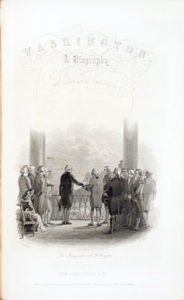
Rufus Wilmot Griswold was a well-known literary critic and editor. Author of Poets and Poetry of America (first published in 1842), in which he promoted the idea of a distinctly American poetry, he is perhaps best known today for his literary feud with Edgar Allan Poe. In the last decade or so of his life, Griswold became interested in historical subjects. He was especially enamored of the first president, and in 1847 he published a work titled Washington and the Generals of the American Revolution in which his brief biography of Washington (later widely reprinted) read: “His superiority was felt by all these persons, and was felt by Washington himself, as a simple matter of fact, as little a subject of question, or a cause of vanity, as the eminence of his personal stature.”
In the early 1850s, Griswold began collecting material for a book on Washington and the social scene of his day. Published in 1854, The Republican Court: or, American Society in the Days of Washington was praised as “an accurate and scholarly production.” In the prefatory note, Griswold wrote that while the book possessed “little merit of a purely literary character, I can claim for it the far more important excellence of a most exact adherence to truth.” (Griswold had a reputation for lying—”Mendacity seems chronic with him,” one critic wrote—so perhaps in his one attempt at history he thought he should emphasize his “adherence to the truth.”)
Here is Griswold’s telling of the inauguration: “A gesture of the Chancellor arrested the attention of the immense assembly, and he pronounced slowly and distinctly the words of the oath. The Bible was raised, and as the President bowed to kiss its sacred pages, he said audibly, ‘I swear,’ and added, with fervor, his eyes closed, that his whole soul might be absorbed in the supplication, ‘So help me God!'”
Rufus Griswold was born in 1815, a quarter century after Washington’s first inauguration, so how did he get this information? A possible answer comes three paragraphs later in the text. “Few persons are now living who witnessed the induction of the first president of the United States into his office,” Griswold writes, but on a recent night, he was walking the streets of New York with his friend John Francis and the famous writer Washington Irving. It happens that Irving was working on his own biography of Washington (for whom Irving was named, incidentally), so no doubt Washington was on his mind. During their stroll, Irving “related … his recollections [of the inauguration]… . He had watched the procession till the President entered Federal Hall, and from the corner of New street and Wall street had observed the subsequent proceedings in the balcony.”
Did Griswold get the story from Irving? Irving was only six years old at the time of Washington’s inauguration, and was standing over 200 feet away (and we know that Washington spoke softly on this occasion). Perhaps Irving shared some general recollections of the inauguration, but not the “so help me God.” Maybe Griswold got the story from someone else, or maybe he just made it up. In any case, this is the first time—sixty-five years after the event—that we have a “record” of Washington saying those words.
Griswold described the inauguration in the sentimental language that was all the rage in both biographies and novels of the time. Washington did not simply say “so help me God,” he added it “with fervor, his eyes closed, that his whole soul might be absorbed in the supplication.” In Inventing George Washington, Edward G. Lengel, current editor of the Papers of George Washington project, described Griswold’s account as “a typical mid-nineteenth-century glob of treacle.” He was perhaps right, but we should add that it was an influential glob of treacle; by the end of the decade, “so help me God” had become an unquestioned part of the Washington inauguration story.
Washington Irving may or may not have told the story to Rufus Griswold, but he included it in his own biography of the first president. Irving, who made a name for himself with such tales as “Rip Van Winkle” and “The Legend of Sleepy Hollow,” had also written historical works, such as a life of Christopher Columbus (which contained the myth that Europeans in Columbus’s day thought the Earth was flat). Irving hoped his five-volume biography of George Washington would be the greatest achievement of his career. He described the inauguration in the fourth volume, published in 1857: “The chancellor advanced to administer the oath prescribed by the constitution… . The oath was read slowly and distinctly; Washington at the same time laying his hand on the open Bible. When it was concluded, he replied solemnly, ‘I swear—so help me God!'”
Three others writers put “So help me God” in George Washington’s mouth in 1857. Caroline Matilda Kirkland, best known for a trilogy of books on life on the Western frontier (she and her husband lived several years in Detroit), dedicated her biography of Washington “to all my young friends, known and unknown, and particularly to my own sons and daughters … , to make his goodness and patriotism irresistibly inspiring to them.” Here is how she described the inauguration: “In kissing the book as he took the oath, he was observed to say audibly, ‘I swear!’ adding, with closed eyes, as if to collect all his being into the momentous act—’So help me God.'”
John Frederick Schroeder was an Episcopalian priest who had already published Maxims of Washington, with over 400 pages of quotations attributed to Washington on (in the words of the subtitle) “Political, Social, Moral, and Religious” topics. Schroeder’s Life and Times of Washington (1857) recorded the inauguration as follows: “While the oath was being administered, Washington laid his hand on the Bible. As its conclusion he said, ‘I swear—so help me God.'”
On March 14, 1857, just after the inauguration of James Buchanan, Harper’s Weekly ran a three-page article comparing that ceremony to the first inauguration. Washington “exclaimed, with closed eyes and much emotion, ‘I swear, so help me God!'” Buchanan, on the other hand, was not reported to have used the phrase. A year later, J. A. Spencer, who ended his History of the United States with Buchanan’s inauguration, wrote that Washington, “reverently appealing to Heaven,” added “So help me God!” to the end of the oath.
This was just the beginning. John N. Norton’s Life of Bishop Provoost, of New York (1859) and his Life of George Washington (1860) both included “so help me God” in their accounts of Washington’s inauguration.
E. Cecil compiled his (or her) Life of George Washington. Written for Children (1859) “with the hope of giving American children some knowledge of Washington’s character.” A couple pages at the end of the book summarize some of the lessons children might learn from Washington’s life: “How could he thus resist temptation? How did he succeed in controlling his passions? There is but one answer. Washington was a religious man.” E. Cecil—the name is possibly pseudonymous, but the writer was certainly Victorian, what with the emphasis on resisting temptation—had Washington saying “so help me God” at the end of the oath.
In 1859, the Mount Vernon Ladies Association, a group formed several years earlier to preserve Washington’s Virginia home, had worked out an arrangement with John Washington, George’s great-grandnephew, to purchase the estate. Benson J. Lossing, a popular historian (in both senses of the phrase) known for his Pictorial Field Book of the [American] Revolution, wrote a history of Mount Vernon to support the MVLA. Mount Vernon and Its Associations, Historical, Biographical, and Pictorial, published in numerous versions with various titles over the years, was dedicated “to his patriotic countrywomen, by whose efforts the home and tomb of Washington have been rescued from decay.” Lossing described the inauguration: “Chancellor Livingston then waved his hand for the multitude to be silent, and in a clear voice, read the prescribed oath. The President said ‘I swear,’ then bowed his head and kissed the sacred volume, and with his eyes closed as he resumed his erect position, he continued with solemn voice and devotional attitude, ‘So help me God!'”
So, before 1854, we have no written record of Washington adding “so help me God” to the oath. Then Griswold wrote it, and by the end of the decade, at least eight other books and magazines recorded the same phrase. “So help me God” quickly became the traditional story. This was not quite the same as Mason “Parson” Weems’s fanciful story of the boy George chopping down the cherry tree with his hatchet, a fable that represented a great Truth about Washington’s character but was not to be understood as literally true. Unlike “I cannot tell a lie,” “so help me God” became gospel. “In Griswold we trust,” we might say, although by 1860, Griswold’s role in creating the myth had been forgotten.
To be sure, not every description of Washington’s inauguration published after 1854 used the phrase. Nonetheless, the post-Griswold inclusion of “so help me God” in Washington biographies was both widespread and persistent. Benjamin Lossing became one of the phrase’s most prolific promulgators; after the Mount Vernon book, he told the “so help me God” story in the three-volume Life of Washington: A Biography, Personal, Military, and Political (1860); in Our Country: A Household History of the United States for All Readers (1877); in Harpers’ Popular Cyclopedia of United States History, from the Aboriginal Period (1881); in Mary and Martha: The Mother and the Wife of George Washington (1886); and in two pieces for popular magazines for the centennial of Washington’s first inaugural (The Independent and Century Illustrated Magazine, 1889).
From the 1860s on, Lossing was joined by dozens of other writers in spreading the gospel of “so help me God.” Among them was Woodrow Wilson, a professor of political science at Princeton, who in his George Washington (1896) wrote that after the oath, the president “bowed his head and said ‘So help me God!’ in tones no man could mistake, so deep was their thrill of feeling.” Seventeen years later, when he was himself taking the presidential oath of office, Wilson did not use that phrase.
Some of these other efforts were aimed (like Kirkland and Cecil, in the late 1850s) at children. Biographies of Washington for children were everywhere in the mid-nineteenth century, ranging from Samuel Goodrich’s Lives of Benefactors in 1844 to an illustrated Heroes of the Revolution in 1846 to Child’s Life of Washington in 1860. Different Washingtons were offered for different genders. Women of Worth: A Book for Girls (1860) republished George W. P. Custis’s biography of Mary Washington, while Mrs. Anna M. Hyde offered The American Boy’s Life of Washington in 1868. Mrs. E. B. (Elizabeth Breckenbrough) Phelps was motivated to write her Memoir of Washington: Written for Boys and Girls and Dedicated to the Pupils, Past and Present (1874) by “observing how little interest the pupils of our charge seemed to take in the history of their own country, and consequently how little knowledge they possessed.”
Josephine Pollard’s Life of George Washington: In Words of One Syllable (1893) was part of a fad in the late nineteenth century of one-syllable books—books aimed at young readers and written using words of only one syllable. Her section on the inauguration begins: “On the last day of A-pril, 1789, Wash-ing-ton took the oath of office in front of the hall where the wise men of the land had been wont to meet in New York.” This sentence shows that the authors of one-syllable books often used proper nouns, regardless of syllabification, and that “one syllable” does not necessarily mean easy (unless most children of the late nineteenth century could be expected to understand “had been wont to meet”).
Hyde, Phelps, and Pollard all used the identical phrase in their descriptions of the inauguration for their juvenile readers: “I swear—so help me God!”
Not surprisingly, histories told with a religious bent often put the “so help me God” into Washington’s inaugural. Such works include Benjamin Franklin Morris’s Christian Life and Character of the Civil Institutions of the United States (1864), written to show that the United States “is pre-eminently the land of the Bible, of the Christian Church, and of the Christian Sabbath.” Rev. J. A. M. Chapman’s “A Christian Republic: Its Grounds, Functions, and Claims,” in Christian Advocate (Dec. 7, 1876) (“I say a Christian Republic, for such I claim ours to be in the design of its founders, in the opinion of the wisest expounders of our national law, and as a recognized fact in our actual history”), and Bishop A. Cleveland Coxe’s “Christianity and the Constitution,” in The Independent (April 5, 1880) (“The spirit of the Constitution speaks for itself, and proclaims itself Christian in all that it implies and presupposes”), both quote “so help me God.”
The centennial year witnessed an outpouring of literary accounts of the first inauguration, almost all of which included Washington taking the oath and adding “so help me God.” In addition to Lossing’s contributions, books by Henry Cabot Lodge (later a five-term senator from Massachusetts) and Horace Elisha Scudder (editor of The Atlantic Monthly through most of the 1890s), as well as articles in The American Magazine, The Cambrian (subtitled A Magazine for the Welsh in America), Century Magazine, The Chautauquan, The Churchman, The Cosmopolitan, The Home-Maker, Frank Leslie’s Popular Monthly, The New York Tribune, and Zion’s Herald, were among the works published in 1889 that included “so help me God.”
As the nineteenth century came to an end, “so help me God” had been firmly entrenched in the nation’s historic memory for four decades. (The works cited above are just a fraction of what would be a very long list.) The phrase was so imbedded that no one in the twentieth century, not even academic scholars with PhDs, thought to question it. Douglas Southall Freeman won a (posthumous) Pulitzer Prize for his six-volume biography of Washington. In the final volume (1954), he recorded the events of inauguration day in great detail (beginning with “When Washington had eaten breakfast….”). Washington took the oath of office, then “reverently he added, ‘So help me God.'” In George Washington: A Biography (1984), John R. Alden, one of the premier academic historians of the American Revolution a couple generations ago, wrote: “Washington repeated the oath, adding solemnly, ‘So help me God.'”
David McCullough won a Pulitzer Prize for his John Adams (2001), a book in which he described the first presidential inauguration: “In a low voice Washington solemnly swore to execute the office of the President of the United States and, to the best of his ability, to ‘preserve, protect, and defend the Constitution of the United States.’ Then, as not specified in the Constitution, he added, ‘So help me God,’ and kissed the Bible, thereby establishing his own first presidential tradition.” It was Griswold, not Washington, who started the tradition, but McCullough and others have certainly continued it. When HBO based a miniseries on John Adams (in 2008, with Paul Giamatti in the title role), viewers could see the inauguration and actually hear George Washington (actor David Morse) say “So help me God.”
So if it was not Washington, who was the first American president to say “so help me God” as part of the oath of office? Perhaps it was Jefferson Davis, who according to the Macon Daily Telegraph used the phrase when he was inaugurated president of the Confederate States of America on February 18, 1861. The first president of the United States of America for whom there is convincing contemporary evidence was Chester A. Arthur, who took the oath following the death of James Garfield in September 1881. Following Arthur, we know that William Howard Taft (1909), Warren G. Harding (1921), Calvin Coolidge (1923), and Franklin Roosevelt (1933) said “so help me God.” From 1933 to the present, every president has used the term. Prior to that, however, the list is short.
In the years after World War II, the story of “so help me God” in American historical memory took another turn. As tensions increased between the United States and the “godless communists” of the Soviet Union, Americans began to use religion as a weapon in the Cold War. “The fate of the world rests with the clash between the atheism of Moscow and the Christian spirit throughout other parts of the world,” said Senator Joe McCarthy, and J. Edgar Hoover added, “Since Communists are anti-God, encourage your child to be active in the church.” The 1950s was the decade that “under God” was added to the Pledge of Allegiance and “In God we trust” became our national motto. And it was in the 1950s that the tradition was established that all presidents, not just Washington, had said “so help me God” as part of their oath.
Frank C. Waldrop, editor of the Washington Times-Herald, led the way in 1948, in response to the Supreme Court’s decision in McCollum v. Board of Education. In that case, the Court ruled that it was unconstitutional for public schools to aid in purely religious instruction. “Every President from Washington down to Harry Truman has always taken that oath [the Constitutionally prescribed presidential oath] with his hand on the Bible, a religious book,” Waldrop wrote in response to the decision, “and more than that, every President so far as this writer can learn has also added the undeniably religious phrase, ‘So help me, God,’ as an unofficial element of his promise.”
Bruce Catton, the famous Civil War historian, solidified this “new” tradition in January 1957, just in time for Eisenhower’s second inauguration. “George Washington was a man inspired,” Catton wrote in one of his occasional “Words America Lives By” pieces, “and his inspiration has come down to all of us, coloring the environment in which we live… . After reciting the formal oath, he put in a short sentence of his own: ‘So help me God.’ Every President since has added those words. They have now become part of the ritual; and it is a good part, an essential part, pledging more than was originally intended when the oath was written… . [Washington] spoke not only for all future Presidents, but for the rest of us too.” And so a century after Rufus Griswold had George Washington saying “so help me God,” Bruce Catton and others made it a part of every presidential oath. It joined “one nation, under God” and “In God we trust” to create a trinity of Cold War religious phrases.
In 2001, the first year of the twenty-first century, Philander Chase, editor of the Papers of George Washington project (1999-2004), was cited in a Washington Post article as saying that the “so help me God” story “is not supported by any eyewitness accounts.” Others had perhaps doubted the story, but Chase’s statement was, according to Ray Soller, “the first public announcement that flat out challenged what historians and pundits … had come to treat as an unchallenged matter of fact.” Newdow v. Roberts, a lawsuit aimed at prohibiting Chief Justice John Roberts from prompting Barack Obama to add the non-Constitutional phrase at the end of the oath in 2009, certainly raised awareness of the issue. Professor Peter R. Henriques, of George Mason University, submitted an amicus brief in the case outlining the historical background, including the lack of contemporaneous account of “so help me God” and the role of Griswold and others in starting the tradition decades later. A shortened version of Henriques’s brief, published as “‘So Help Me God’: A George Washington Myth That Should Be Discarded” by History News Network in January 2009, became perhaps the most-cited scholarly discussion of the issue.
Ron Chernow’s Washington: A Life (2010), one of the latest Washington biographies and another Pulitzer Prize winner, addressed the issue this way: “Legend has it that he added ‘So help me God,’ though this line was first reported sixty-five years later. Whether or not Washington actually said it, very few people would have heard him anyway, since his voice was soft and breathy.” Chernow’s gentle handling of the phrase contrasts with Edward Lengel’s, in Inventing George Washington (2011): “Any attempt to prove that Washington added the words ‘so help me God’ requires mental gymnastics of the sort that would do credit to the finest artist of the flying trapeze.” The contrast is one of tone only; Chernow and Lengel, in questioning the traditional story and acknowledging that it lacks an evidentiary foundation, signal a change in our historic memory, almost as sudden as was the diffusion of the “so help me God” story a century and a half earlier.
Scholarly debunking does not always equal popular acceptance, of course. The current debate—Did Washington say “so help me God” or not?—often has little to do with historical accuracy and much to do with particular political and religious agendas. But that aside, the post-1854 ubiquity of “so help me God” tells us something about how easily “facts” can become part of our shared historic memory.
Further Reading
Most of the nineteenth-century works listed above are available through Google Books or Internet Archive. For other discussions of “so help me God” in the presidential oath of office, see Frederick B. Jonassen, “Kiss the Book, You’re President: ‘So Help Me God’ and Kissing the Book in the Presidential Oath of Office,” William & Mary Bill of Rights Journal, 20 (2012): 853-953, and Mathew Goldstein and the Nonbeliever Antidiscrimination Project, “So Help Me God in Presidential Oaths.” Ray Soller’s unsurpassed work on “so help me God” often appears in the American Creation blog. Peter Henriques’s “‘So Help Me God’: A George Washington Myth That Should Be Discarded” is available at History News Network. Edward G. Lengel writes about this and other Washington myths in Inventing George Washington: America’s Founder, in Myth and Memory (New York, 2011).
This article originally appeared in issue 15.1 (Fall, 2014).
David B. Parker, professor of history at Kennesaw State University, is the author of Alias Bill Arp: Charles Henry Smith and the South’s “Goodly Heritage” (1993) and editor (with John D. Fowler) of Breaking the Heartland: The Civil War in Georgia (2011). He has written numerous articles and essays on American cultural history.



